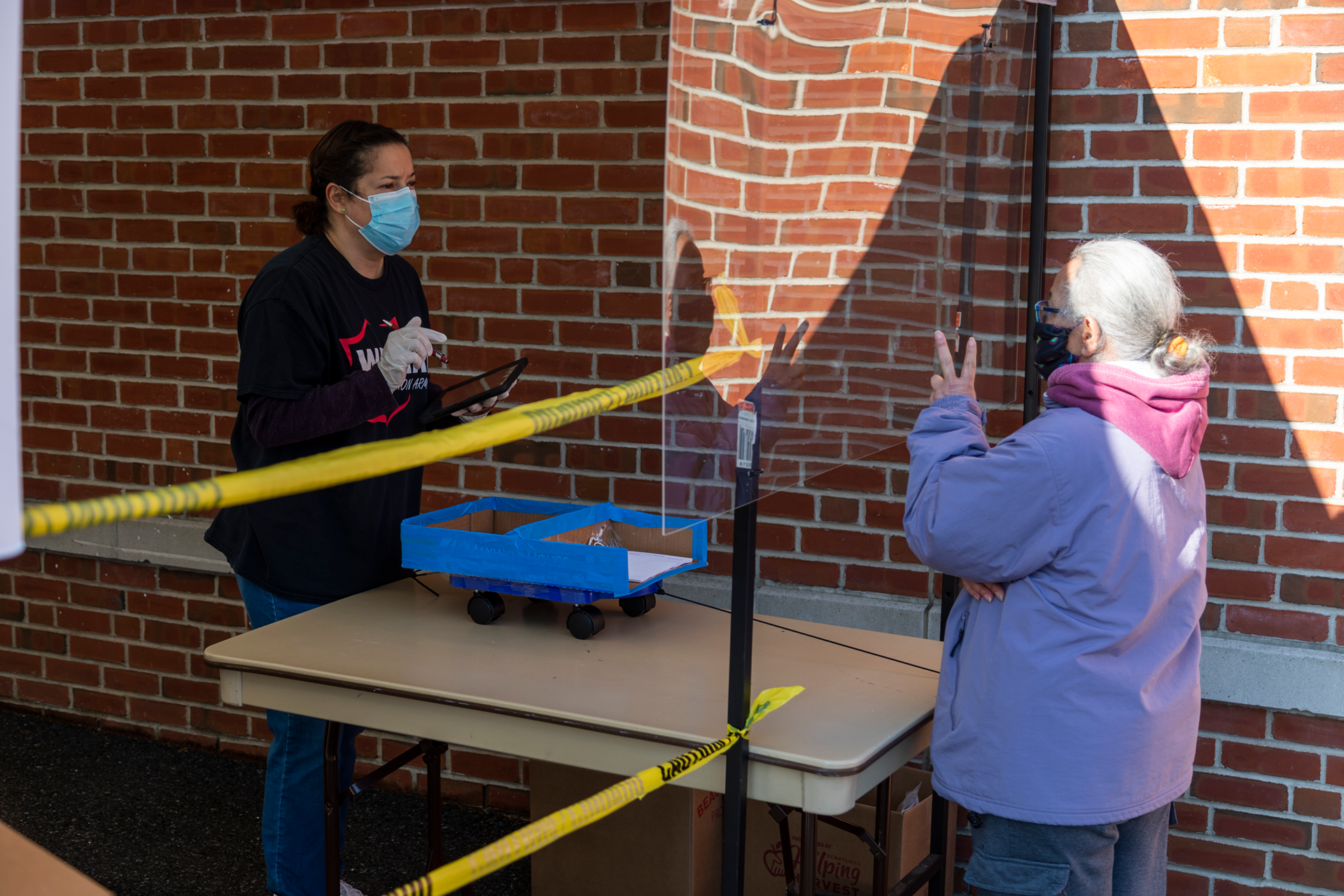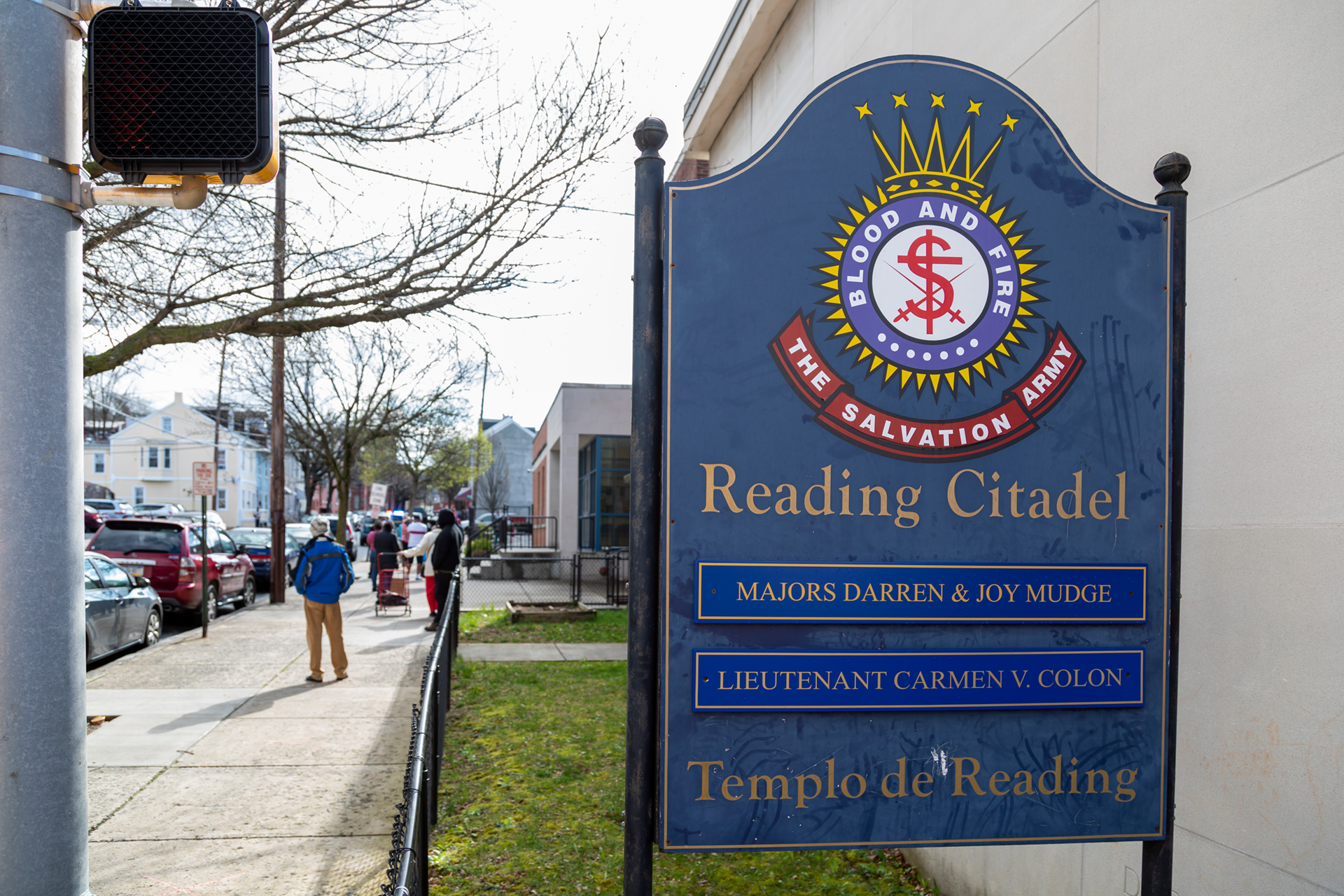Dispensing Food and Hope in Reading PA.
READING, PA
As Major Darren Mudge drives through a narrow treelined street in Reading, Pa., he passes wooden townhouses that exude a somber mood. He also sees people on a long line, spaced 6 feet apart. In addition to wearing sneakers, hoodies, and jeans—masks cover their faces but fail to hide the urgency in their eyes. They’re on their way to the local Salvation Army and Mudge, corps officer, plans to meet them there. For 4 straight weeks, he and his staff have provided food boxes for them in the midst of the COVID–19 pandemic.
In Reading, a senior has died and 49 people statewide. Throughout the USA Eastern Territory, doctors, nurses, and other healthcare professionals are also dying. Blue–collar workers, the elderly, and people with preexisting conditions are among the hardest hit.
MEETING THE NEED
“We’re trying to load people up with as much food as we can,” Mudge said during an interview with SACONNECTS magazine. “We’re meeting their basic and greatest needs,” he said. “There is a deep pocket of poverty here.” Ranked the poorest city of its size in the U.S., even before many people lost their jobs due to the pandemic, Reading is also home to a diverse racial and ethnic demographic.
“To be able to encourage somebody and meet their need; to see their smiling faces; and to hear them say ‘thank you’ and ‘God bless you’ is a real encouragement to us,” said Mudge. Many people are surprised that such help is available. “Thank you for being so generous,” is a common refrain.
“Residents get two boxes of food and bags of frozen and refrigerated goods. “We’re really trying to set them up for a couple of weeks,” Mudge said. As many as 500 to 600 families receive food per week.
The goods come from a local food bank. During the week, corps staff pick them up on Thursday and Friday. They pack them on Monday and Tuesday and then distribute them on Wednesday. “We are starting to get some pre–boxed meals through our division’s disaster services, which will make the lives of our staff a lot easier,” said Mudge.
STAYING HEALTHY
For the corps team, the challenge is staying strong—physically, mentally, and spiritually. “We’ve been doing this now for 4 weeks and it has been exhausting,” Mudge said. This kind of work is stressful. I know because we hold staff meetings on a weekly basis, and we check on people to see how they are doing. I’ve done 15 to 20 disaster deployments in my time as an officer. So, I’ve got some experience in understanding what people go through. Our folks are really concerned about helping the community, but they’re also concerned about not getting infected themselves.”
Mudge says the key to managing such emotions is getting enough rest and putting safety measures in place. “Yesterday, we shut down so our people could take a 4–day weekend and just relax. We wanted to give them a break so they can come back refreshed and take on the work that we’ll need to continue for several more weeks. This is going to be a long–term effort.”
Being in compliance with mandated safety standards also helps. “We’re keeping our distance from folks as our people work behind the scenes. We’ve set up plexiglass and use it as a screen while we speak to people.” Small orange traffic cones also mark where they should stand on the line.
“Every time I go into the community, I put on a mask and gloves; not only because I don’t want to get infected, but because I might infect someone else, if I have the virus.”
Mudge says the decision to become more concerned about others than about oneself is another stress reliever. “So that’s changed our focus and it’s been a huge blessing and benefit to us.”
WHAT THE FUTURE HOLDS
Mudge says the most frequent question people ask is, “When is this going to end so we can get back to some sort of normalcy?” But embracing a new normal is more likely to happen. “Initially, we’ll see a coming together of people,” said Mudge. “There’s a longing for companionship and camaraderie and that ‘family’ feeling. Eventually I think we’ll see an increase of folks coming to church and worshipping together.
“So often, we just do our work, but miss seeing the blessings we give to others. This [pandemic] can be used by God to impact lives in ways we never thought possible.”
by Warren L. Maye









